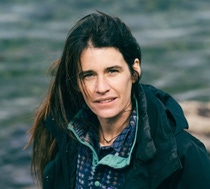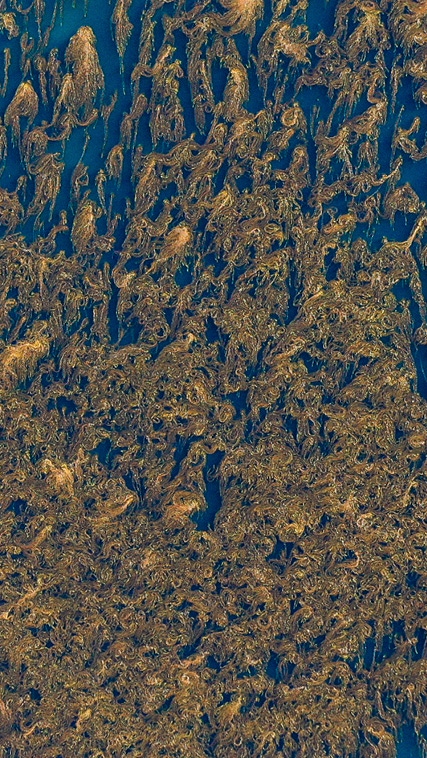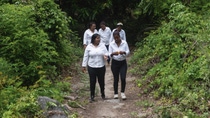Media
Marine conservation: protecting the future of the oceans
Martu’s deep connection to the sea
Argentinian environmental activist and marketing expert Martina Sasso is revolutionizing marine conservation in her home country through her NGO Por el Mar. Read on for a profile of a true visionary and pragmatist – and a woman who is tireless in her pursuit of success.
At a glance:
-
Under Sasso's leadership, a ban on offshore salmon farming has been enacted, and the destruction of kelp forests has been halted.
-
Por el Mar is built on a sustainable model that integrates community engagement, scientific research, political advocacy, and effective public relations.
-
The organization plans to enhance protections for shark habitats in the future, as the shark population in Argentina is severely threatened.
Committed to healthy oceans and biodiversity
As recently as a few years ago, marine conservation was not an issue in Argentina. Marine protected areas existed, but they were few and far between, and tended to be small. Salmon farming was big, despite the detrimental environmental impact, and kelp forests were cleared to make way for more farms. Yet as a vehicle for carbon sequestration, these underwater ecosystems are just as crucial as tropical rainforests.
Enter Martina Sasso. Since 2017, she has dedicated herself full-time to marine conservation. Now, huge stretches of water around Argentina’s southern shores are under conservation protection, putting a stop to the uncontrolled destruction of the kelp forests. Argentina was also the first country in the world to ban ocean salmon farming by law. Without Martina Sasso’s work, this would not have happened – or at least not so quickly. But her achievements don’t stop there.
Thirty-eight-year-old Martina Sasso from Buenos Aires is a movie director and communications expert by training, and an experienced advertising and marketing specialist. She is also the founder of the marine conservation organization Por el Mar (which means “For the Sea”). She heads a team of 38 employees, around three quarters of them women, and serves as a point of contact for Argentina’s provincial governors and federal ministers. Martina’s pragmatic approach to marine conservation has proved effective, but she is also something of a visionary: “Most of our planet’s biodiversity has been lost within the last hundred years or so. The rich variety of our flora and fauna has diminished. But I believe that we can regain what we once had. There’s still enough time for us to make changes.” To achieve this, she works 60 hours a week, or even more.

Portrait
MARTINA SASSO
Born and raised in Buenos Aires, Sasso went to Costa Rica at the age of 19, where she ran a beachfront restaurant. Back home in Argentina, she studied advertising and cinematography and went on to pursue a career as a creative director at an advertising agency, before switching to working full-time for the environmental organization Rewilding Argentina in 2017. In 2022, she established the marine conservation organization Por el Mar. The 38-year-old has a son, and her hobbies include sailing, surfing and playing the guitar and drums.
The vibrant force behind Argentina’s ocean conservation movement
Martina turns up for our Zoom interview promptly at 1 pm Argentinian time, and immediately offers an apology: “I’ve been doing interviews all morning, would you mind if I just make myself a cup of tea?” Of course not! Six minutes later, she is back and ready to get started. She’s wearing a fleece sweater with a multicolored pattern that echoes indigenous South American motifs. The label bears the name Patagonia – surely no coincidence: The clothing brand’s founder, Yvon Chouinard, is also a keen environmental activist and his company is a key sponsor for Por el Mar. Martina has made a cup of traditional mate tea, which she drinks in proper South American style through a metal straw. When we begin our conversation, her very long, dark hair, gathered up in a bun, is so irrepressibly shiny that it reflects the optimism, joy, and vivacity she herself radiates – even when broaching serious and complex topics. It’s almost as if she has her own internal solar power generator, complete with batteries for perpetual energy, requiring only light and air to generate incredible dynamism, ideas, and creative drive.
I feel a deep empathy for the creatures of the ocean.“
“I’m a workaholic,” confesses Martina, who is known as Martu to virtually everyone, from colleagues to top politicians. She usually works from 8 in the morning to 8 or 9 at night, but only from Monday to Friday. Her weekends are reserved for family, which means herself and her young son. “I got married seven years ago and our son Beto was born three years ago, the same year my husband died,” she continues, “A year after that, I set up my organization Por el Mar. It all kind of happened at once.” What drives her? “I love nature. I feel connected with it. This connection gives me strength. I love the sea; that’s my great passion. I’m a sailor and a surfer, and I feel a deep empathy for the creatures of the ocean.” This empathy is something many people lack. They know that if the oceans were to disappear, the history of humankind would abruptly come to an end, but there’s no sense of emotional affinity. The activist realizes that this applies to many people, including in Argentina: “The sea is an important economic factor since we export 95 percent of what we extract from it. But Argentina isn’t doing much in the way of marine research.” For some reason, the ocean doesn’t seem to attract much interest. In an effort to change this, Por el Mar organizes swimming and standup paddleboarding courses in coastal locations. These are one of the four pillars on which the organization’s success rests.
1. Taking action together: empowering local communities
Martina calls this first pillar “Community stewardship.” Unlike many other NGOs, Por el Mar doesn’t deploy environmental educators; instead, it has its own staff based in the places where there is potential to make a difference, and a need to do so. These local experts work with people in their own neighborhoods to develop programs and activities designed to raise awareness of oceans and teach them why they need to be protected. Their project offers diving courses for children, community beach cleanups, workshops and group wildlife observations.
2. Exploring and preserving marine ecosystems
Por el Mar’s second strategic pillar involves science, research and practical marine conservation measures. For instance, it employs scientists to map important but uncharted areas beneath the ocean’s surface. It is also currently working on a project to restore kelp forests.
3. Putting marine environment on the agenda
The NGO’s third pillar is lobby work. “We approach local and regional politicians, we go to the National Congress, we talk to everyone,” says Martina.
4. Raising awareness and taking the initiative for new laws
The final crucial factor in the organization’s success – the fourth pillar – is public relations. As Martina points out: “We have a great communications team.” In 2024, for example, Por el Mar released “Pyrifera,” a short film about marine life in the Patagonia region. This prompted a campaign to light up public buildings in blue on the evening of June 8, which is when the United Nations marks World Oceans Day.
Thanks to these four pillars, it rarely takes Martina more than two or three years to achieve her project targets: getting a new law passed, for example, or having a new section of ocean designated a marine protected area.
A conservationist facing setbacks
It was a miss rather than a hit that kick-started Martina’s career as a marine activist. In her twenties, she worked as a creative director for a big advertising agency. Her job involved giving strategic advice to major companies. “I decided to do the same thing in my free time too,” she recalls, “South of Buenos Aires there’s Mundo Marino, a marine park with an aquarium where a solitary orca, Kshamenk, lives in a small tank. There are dolphins there too, to keep the visitors entertained. I felt terribly sorry for these creatures.” At the time, activists were protesting animal cruelty and spray-painting accusations like “Orca murderers!” on the walls, but nothing changed. So, Martina targeted the managers instead: “I wrote an email saying ‘What can we do to help your park get by without any large marine animals? Times are changing and people don’t want this kind of thing anymore. You need to plan for the future, otherwise you could soon be facing the threat of closure.’ They invited me to come and talk to them and we started working together. I contacted Disney’s management and found out from them how a great park could be run without animals.
I’ll carry on. And I’ll put all the strength I have into it.“
For six months, I was working at the advertising agency by day and slaving away like crazy every evening for Mundo Marino, for no pay.” At the end of those six months, the pivotal moment came. “It was during a board meeting,” Martina recalls, “They looked at me and said ‘Martu, you know what? Your ideas and plans are wonderful, but we make good money by doing things the way we do now. We don’t need to change anything.’” On the journey back – it was four hours’ drive each way – she wept tears of anger and disappointment – but not of despair. By the time she got home, the decision had been made: “I’ll carry on. And I’ll put all the strength and dedication I have into it.” So, she quit her job at the advertising agency and started working full-time in marine conservation. In 2017, she was put in charge of the Marine Program at Rewilding Argentina, a major organization. Then in 2018, she founded the worldwide Global Salmon Farming Resistance initiative. In 2022, she launched Por el Mar, an NGO that now has an annual budget of 2 million U.S. dollars – just from donations from businesses, foundations and partner organizations.

Better protection for endangered marine species
Martu stepped down from Global Salmon Farming Resistance last year: “It became too much for me. But what I am good at is this: finding the right people and putting teams together.” Salmon farming may no longer be an issue in Argentina, yet there is still plenty of other work to be done. Por el Mar has set up a research laboratory, for instance, where biologists in collaboration with international researchers are experimenting with cultivating algae to repopulate the underwater kelp forests. The next big project involves protecting sharks. “Argentina has lost 80 percent of its shark population,” Martina explains, “People hunt them as a hobby and kill them for fun. It’s a popular weekend pastime, but the dead sharks are just left to rot.” Now, Por el Mar is aiming to set up shark reserves and encourage people to rediscover the emotional connection with the sea and its wildlife they once had. After all, it’s our nature.







